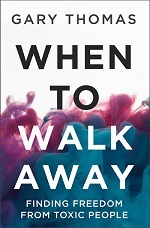A Bad Result Doesn’t Mean You Made a Bad Decision

Having
a net worth of nearly two billion dollars, American investor Howard Marks is a
fan of poker and other games that combine skill and chance. He writes an
occasional investment letter and in a recent one talks about what he’s learned
from reading Annie Duke’s Thinking in Bets: Making Smarter Decisions When
You Don’t Have All the Facts. Annie Duke has won over four million dollars
in professional poker, so she knows a little bit about making quick decisions
without always having all the desired information.
Marks
uses Duke’s insights to come up with a few conclusions for investing that are
also true for dealing with toxic people.
First
and most importantly, “You can’t tell the quality of a decision from the
outcome.” You can make a wise and reasoned decision with someone and even respond
in the perfect way, but the relationship, office situation, family dynamics, or
marital issues may still “blow up.” That doesn’t mean you made a bad decision,
however. Toxic or evil people don’t always respond to life-giving truth in a
healthy way. In fact, they rarely do.
In When to Walk Away, I mention how God’s decision to have the incarnate
Jesus born into this world eventually led to the “slaughter of the innocents”
as Herod tried to prevent the Messiah from growing up. Herod ordered all boys
around Bethlehem two years old and younger to be murdered. Was this God’s
fault? Should he have anticipated it and decided to forgo the incarnation? Of
course not. God made a wise and good decision; an evil man responded to that
good and wise decision in an evil way and acted wickedly.
I
could have also cited how after God delivers Peter from prison in Acts 12 (A.D.
41) by having an angel wake Peter up and walk him past two guard posts, Herod
commanded that all the guards (sixteen in all) be tortured and then put
to death (Acts 12:19). The supernatural deliverance of one disciple led
to the torture and murder of sixteen Roman soldiers. Does that mean God
should have allowed an early leader of the church to be murdered before his
time of ministry was up, just to prevent the deaths of sixteen others?
Looking
through the long-term lens of church history and God’s work on this earth, having
Jesus be born and delivering Peter from prison were both good, wise and
life-giving decisions for God to make—even though both of those acts resulted
in the deaths of dozens of “innocent” people. An evil response to a loving
decision doesn’t make the loving decision wrong. It just demonstrates that we
live in a fallen world.
There’s
another aspect to dealing with toxic people, however. Annie Duke points out
that when you make a good decision between two unappealing choices, the
situation isn’t likely to turn out well regardless. Toxic people can act in
such a toxic manner that there isn’t a solution available in which nobody gets
hurt or angry. And sometimes the situation/relationship can be so toxic that the
best even a skillful surgeon can do is try to limit the damage. That doesn’t
mean you made a bad decision; it just means you were forced to confront an awful
situation as wisely as possible.
Here’s
today’s message in a nutshell: when dealing with toxic people you might make a
good and wise decision that honors God and yet you may still be fired,
slandered, or even divorced. In a fallen world, a wise process doesn’t
always lead to a pleasant or even “victorious” outcome. Toxic people have a
tendency to take their “pound of flesh” even as they are stymied and
confronted.

What
I want to do with this short post is remove the guilt some of you may have
because you employed the Scriptures and advice from When to Walk Away:
Finding Freedom From Toxic People and the relationship/office
environment/church setting wasn’t “fixed.” That doesn’t mean you messed up. It
doesn’t mean that if you had made a different decision or said something
different things would have turned out better. In fact, things may well have
turned out much worse. Plus, you can’t know if your healthy response will
eventually be used to bring conviction to the person in question somewhere down
the road (maybe even after you’re gone).
There
are no guarantees when we’re forced to relate to toxic people. We can and should
be wise and loving with every decision, but we can’t always “fix” the immediate
worlds we live in. Learn how to own and live with the process, not the
outcome.
The post A Bad Result Doesn’t Mean You Made a Bad Decision appeared first on Gary Thomas.



